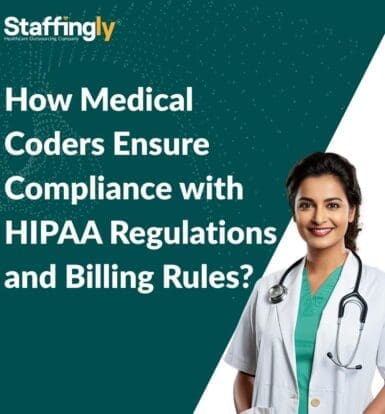On-Demand Outsourcing BPO Services for Healthcare Providers With 24/7 Coverage!
Save up to 70% on staffing costs!
Browse Specialty Staffing Services
What Are the Main Responsibilities of Medical Scribes?
Medical scribes are an integral part of the modern healthcare ecosystem. With a shift from volume-centric to patient-centered care and streamlined operations in clinical environments, the purpose of a medical scribe has become more and more significant. These professionals serve as the physician’s aide, with filming as their main concern, enabling providers to do their job most effectively – take care of patients. So, what is the scope of work of a medical scribe and what impact can it have

Why Are Modifier Codes Important for Claims Processing?
Modifier codes are indispensable in the complex picture of the medical billing and claims ecosystem. While modifiers may seem like innocuous two character suffixes added to procedure codes, their impact is far-reaching. They serve to elaborate on particular details about the care/service rendered by providers so that claims are well understood and payments are processed without delay. Let’s delve deeper into the details of modifier codes and why they are important in enhancing your claims success ratio. Key Takeaways

Why Virtual Medical Scribing Is the Future of Healthcare Documentation?
Healthcare documentation is undergoing a digital revolution, and at the heart of this transformation is virtual medical scribing. With growing demands on providers to balance patient care with administrative tasks, virtual scribes are emerging as the ultimate solution. They simplify documentation, enhance efficiency, and allow providers to focus on what truly matters: their patients. Key Takeaways Virtual medical scribes provide real-time documentation support, saving providers valuable time. They reduce administrative burdens, leading to improved patient care and provider satisfaction. Leveraging

What Are the Biggest Medical Coding Challenges for Rural Providers?
Medical coding is essential for accurate billing and compliance in healthcare, but for rural providers, it can feel like navigating a complex maze. Limited resources, a shortage of skilled coders, and the ever-evolving coding guidelines make the process overwhelming. These challenges not only strain operations but also threaten financial stability. Let’s uncover these hidden hurdles and see how outsourcing medical coding to experts like Staffingly, Inc. can transform the way rural healthcare providers manage their billing and compliance. Key Takeaways

How Do Medical Scribes Handle Sensitive Information During Telemedicine Sessions?
Telemedicine is changing the landscape of the healthcare industry by allowing to obtain care services from anywhere at any time with great ease. But with this ease comes the burden of dealing with managing sensitive patient information in the required security measures, abiding by the mandates of laws such as HIPAA. Medical scribes, electronically capture and create medical documents during a telemedicine interaction, so that the physician can pay full attention to the patient while receiving tele-consultation and patient data

Can Medical Coders Be Held Responsible for Insurance Claim Denials?
When a healthcare claim is denied by an insurance company, the first question many providers ask is, “What went wrong?” Often, fingers point toward medical coders, whose role is to translate a patient’s clinical documentation into standardized codes for billing and insurance purposes. But is it fair to hold medical coders responsible for claim denials? The answer is more nuanced than a simple “yes” or “no.” Key Takeaways Medical coders play a critical role in accurate claims submission but are

What Tools Do Virtual Scribes Use for Real-Time Documentation?
Virtual scribes play an increasingly vital role in modern healthcare, assisting providers with accurate, real-time documentation during patient encounters. By leveraging specialized tools and software, they streamline the process of recording patient information, allowing healthcare providers to focus on delivering quality care. But what exactly are the tools and platforms that virtual scribes need to master? Key Takeaways Electronic Health Record (EHR) Systems: Virtual scribes must become proficient in EHR platforms like Epic, Cerner, or Athenahealth to document patient encounters

How Medical Coders Ensure Compliance with HIPAA Regulations and Billing Rules?
Healthportunities embodies various activities such as billing, coding and claim submissions. This is the procedure that ensures that billing and reimbursing is done in the most accurate and compliant manner possible. It implies that a doctor has a right to attention when several potential patients are willing to go under the knife trust insurance companies to do the paper work as though submitting a wish to the heavens. All they have to do is put layers of codes for the
 Book a Demo to Build Your Team Today!
Book a Demo to Build Your Team Today!


 Read Case Studies
Read Case Studies 



 Virtual Medical Assistants
Virtual Medical Assistants



